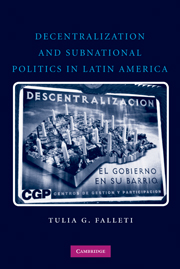Book contents
- Frontmatter
- Contents
- List of Tables
- List of Figures
- Acknowledgments
- List of Abbreviations
- 1 Decentralization and the Revival of Subnational Politics
- 2 A Sequential Theory of Decentralization and the Intergovernmental Balance of Power
- 3 Argentina
- 4 Colombia
- 5 Brazil
- 6 Mexico
- 7 Conclusion
- Bibliography
- Appendix: List of In-Depth Interviews
- Index
7 - Conclusion
Decentralization, Temporal Analysis, and Territorial Politics
Published online by Cambridge University Press: 05 June 2012
- Frontmatter
- Contents
- List of Tables
- List of Figures
- Acknowledgments
- List of Abbreviations
- 1 Decentralization and the Revival of Subnational Politics
- 2 A Sequential Theory of Decentralization and the Intergovernmental Balance of Power
- 3 Argentina
- 4 Colombia
- 5 Brazil
- 6 Mexico
- 7 Conclusion
- Bibliography
- Appendix: List of In-Depth Interviews
- Index
Summary
The scholarly record regarding the impact of decentralization on a wide range of political and economic phenomena such as democratization, conflict resolution, governance, macroeconomic stability, and social and regional inequality is mixed, to say the least. The claim that decentralization leads to higher levels of fiscal efficiency, better government performance, and higher levels of political participation and accountability has been disputed by those who argue that decentralization increases economic instability and political clientelism. Interestingly, both the advocates and the critics of decentralization alike assume that these policies necessarily augment the power of subnational governments. In their analyses, an increase in the power of subnational officials (seen either as local heroes or as tyrants) is the intervening variable between decentralization and the outcomes of the reforms.
However, as this book shows, a closer examination of the consequences of decentralization across Latin America reveals that the magnitude of such change can range from insignificant to substantial. In some countries, such as Brazil and Colombia, decentralization policies led to the expected result – increasing the power of subnational officials. In other countries, decentralization had a more moderate effect, as in the case of Mexico, or did not even alter the balance of power between levels of government, as in the case of Argentina. Why do some governors and mayors gain power from decentralization reforms while others do not?
- Type
- Chapter
- Information
- Decentralization and Subnational Politics in Latin America , pp. 231 - 248Publisher: Cambridge University PressPrint publication year: 2010



